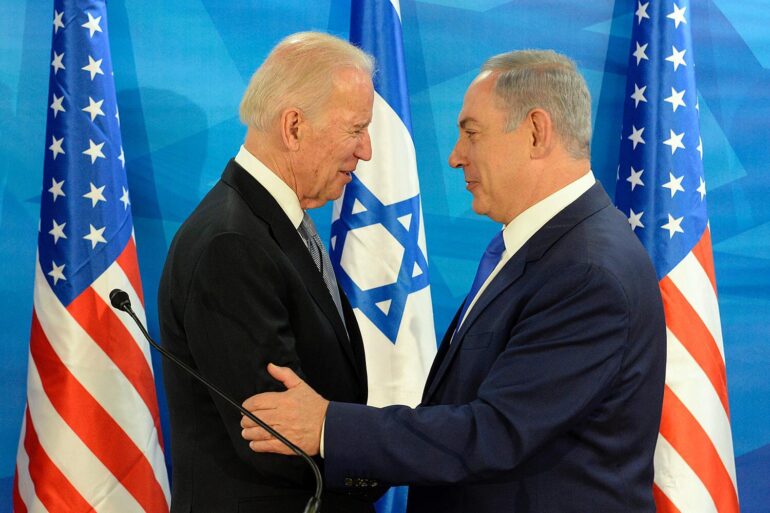It’s unfortunate that it takes moments of national crisis for us to clearly see what’s hiding just beneath the surface in our reality. Nowhere is this more true than in Israel’s relationship to the United States – specifically our military and political dependence on our “greatest ally.”
The US-Israel relationship as it exists today can be traced back to the Six Day War. In the aftermath of the Sinai crisis of 1956, Israel withdrew from peninsula on the condition that Washington and its NATO allies would guarantee the freedom of Israeli shipping from Eilat through the Straits of Tiran.
Additionally, a UN peacekeeping force, UNEF was established to prevent Egyptian forces from mobilizing into the Sinai.
Despite these guarantees, when Egyptian president Gamal abd-el Nasser closed the straits, and pushed UNEF to abandon their posts, the United States and its allies were silent. The US State Department insisted that it would only support Israel military if the Soviet Union intervened, but that it would continue to supply Israel as long as Israel didn’t initiate hostilities.
Unsurprisingly, the Israeli government took little reassurance from the American position, and, by acting independently to guarantee its own safety, Israel won a miraculous victory over its enemies.
Since the Six Day War, US foreign policy regarding Israel has been aimed at ensuring that Israel can never again “go rogue” as it did then. By plying Israel with military aid that must be spent at American vendors like Boeing and Lockheed Martin, successive US administrations have crippled our domestic defense industries, making Israel’s security functionally dependent on Washington.
Israeli society’s infatuation with Donald Trump’s presidency was a clear indication of the extent to which the material dependency inherent in the US-Israel relationship has shaped Israel’s self-perception.
The Israeli public’s celebration of Trump’s recognition of Jerusalem as the Israeli capital (a political reality since 1948) and the annexation of the Golan (a political reality since 1981) betrayed a deep weakness in Israel’s national camp.
By treating Trump’s decisions as a great favor to the Israeli people, rather than the tacit acceptance of facts on the ground that were won by Israeli soldiers through great sacrifice, Israelis have turned their material dependency on Washington into a far deeper internalized acceptance of neo-colonial influence.
It is thus no surprise that Israelis are so baffled by the responses of US politicians to this current crisis in Israel.
On one side, President Joe Biden has publicly declared that Israel has responded proportionally to attacks from Hamas (using American planes and missiles), while the more progressive wing of the Democratic Party has loudly condemned Israel’s actions, advocating to cut off aid until Israel accepts US demands for handling our national security.
These apparently contradictory approaches betray the deeper interests of American politicians across the spectrum – use the US-Israel relationship to deepen Israeli dependence and limit Jerusalem’s ability to act independently.
This dual approach is not unique to the Democratic Party. During the Yom Kippur War, President Richard Nixon’s Secretary of State Henry Kissinger kept US support to Israel to a minimum, until Prime Minister Golda Meir ordered the preparation of nuclear warheads – a move that forced the administration’s hand to provide aid in Operation Nickel Grass in an effort to prevent nuclear war.
President Ronald Reagan, withheld shipments of planes to Israel after Israel’s air force used US planes to attack an Iraqi nuclear facility.
President George H.W. Bush threatened to endanger the US-Israel relationship by halting a loan to Israel to assist in settling recently arrived Soviet Jewish refugees, conditioning it on a construction freeze in the West Bank and entering the Madrid Peace Conference. His son, President George W. Bush, was similarly critical of West Bank Jewish construction and forced Prime Minister Ariel Sharon to surrender the Gaza region and to destroy four Jewish towns in northern Samaria.
On both sides of the American political aisle, the “generous” military aid from Washington has always been conditioned on submission to US interests and political demands. The sooner the Israeli public wakes up to this reality, the sooner we can begin to get free and become the masters of our own fates.
Freedom from the forces of empire would give Israel the opportunity to advance the story of our historic return to the world stage, without the foreign shackles that have already held us back for over half a century.





